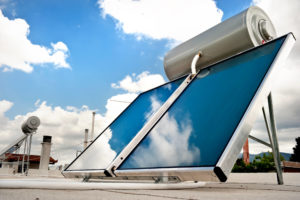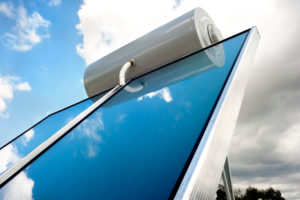As the demand for clean energy solutions continues to rise, solar hot water systems have become an eco-friendly alternative to traditional heating methods. This article will explore the pros and cons of solar hot water, shedding light on the benefits of harnessing solar energy to heat water while considering the potential drawbacks. Understanding these factors will help homeowners make informed decisions when considering the installation of a solar water heater.
Contents
- 1 Key Takeaways
- 2 The Benefits of Solar Hot Water
- 3 Advantages of Solar Hot Water Systems
- 4 The Drawbacks of Solar Hot Water
- 5 Disadvantages of a Solar Water Heater
- 6 Pros and Cons of Solar Hot Water Systems
- 7 Case Study: Evaluating the Pros and Cons of Solar Hot Water Systems
- 8 Expert Insights From Our Solar Panel Installers About Pros and Cons of Solar Hot Water
- 9 Experience Solar Excellence with Us!
- 10 Conclusion
Key Takeaways
- Solar hot water systems offer numerous benefits, including harnessing clean and renewable energy, cost savings, and reduced environmental impact.
- Important considerations include higher upfront costs, dependence on sunlight availability, space requirements, and maintenance needs.
- Homeowners should evaluate the pros and cons based on their specific circumstances and consult a reputable solar installer to make informed decisions about installing a solar hot water system.
The Benefits of Solar Hot Water
Solar hot water systems offer numerous advantages, making them an attractive option for homeowners seeking to reduce their environmental impact and save on energy costs. Let’s delve into the key benefits:
Harnessing Clean and Renewable Energy
One of the most significant advantages of solar hot water systems is their reliance on clean and renewable energy from the sun. By utilizing solar energy to heat water, homeowners can reduce their reliance on fossil fuels and contribute to a greener, more sustainable future.
Cost Savings on Energy Bills
Solar hot water systems can substantially save energy bills over the long run. As solar energy is free and abundant, homeowners can significantly reduce their reliance on traditional heating methods, resulting in lower monthly heating bills and potential payback of the upfront investment.
Reduced Carbon Footprint and Environmental Impact
Homeowners actively contribute to reducing greenhouse gas emissions by shifting to solar hot water systems. Unlike traditional heating systems that rely on fossil fuels, solar water heaters produce zero emissions during operation, making them an environmentally friendly choice.
Long-Term Reliability and Durability
Solar hot water systems are known for their durability and longevity. With proper installation and maintenance, these systems can provide reliable hot water for many years, often exceeding the lifespan of traditional water heating systems.

Advantages of Solar Hot Water Systems
Solar hot water systems offer several advantages over traditional heating methods. Let’s explore the key benefits in detail:
Independence from Fossil Fuel Dependency
One of the significant advantages of solar hot water systems is their independence from fossil fuels. Unlike traditional systems that rely on natural gas or electricity, solar water heaters utilize renewable energy from the sun, providing homeowners with greater energy independence and reducing their vulnerability to fluctuations in fossil fuel prices.
Higher Energy Efficiency compared to Traditional Systems
Solar hot water systems are designed to be highly energy-efficient. By directly harnessing solar energy to heat water, these systems minimize energy losses that typically occur in traditional heating methods, improving overall efficiency and reducing energy consumption.
Incentives and Rebates for Solar Hot Water Installations
Many governments and utility companies offer incentives and rebates to homeowners who install a solar hot water system. These financial incentives can help offset the upfront installation cost, making solar water heaters more affordable and appealing.
Potential Increase in Property Value
A solar hot water system can add value to your property. As eco-friendly features become increasingly desirable in the real estate market, having a solar water heating system can be a selling point that sets your home apart and attracts environmentally conscious buyers.
The Drawbacks of Solar Hot Water
While solar hot water systems offer many benefits, it’s important to consider the potential drawbacks. Let’s examine the key considerations:
Higher Upfront Costs and Installation Expenses
One of the primary disadvantages of solar hot water systems is the higher upfront cost compared to traditional water heating systems. The initial investment includes purchasing and installing solar panels, a solar storage tank, and other system components. However, it’s essential to note that the long-term energy savings can help offset these upfront costs over time.
Dependence on Sunlight Availability
Solar hot water systems rely on sunlight to generate heat. During periods of limited sunlight, such as cloudy or overcast days, the system’s performance may be affected, resulting in reduced hot water availability. Homeowners in regions with inconsistent sunlight patterns should consider this potential limitation when deciding on a solar water heating system.
Space Requirements for Solar Panel Installation
Solar hot water systems require adequate space for the installation of solar panels. Homeowners must assess the available roof or ground space to ensure sufficient area for optimal solar panel placement. Properties with limited space may face challenges in accommodating the necessary number of panels to meet their hot water needs.
Maintenance and Potential System Issues
Solar hot water systems require periodic maintenance to ensure optimal performance, like any complex system. Components such as pumps, valves, and controllers may require servicing or replacement over time. Homeowners must factor in the maintenance requirements and potential system issues when installing a solar water heating system.

Disadvantages of a Solar Water Heater
Let’s delve deeper into the specific disadvantages associated with solar water heaters:
Inadequate Hot Water Supply during Extended Cloudy Periods
Solar water heaters rely on sunlight to heat water. Extended periods of cloudy weather can reduce the system’s ability to generate sufficient hot water. Homeowners should consider their geographical location and climate when evaluating the feasibility of a solar water heating system.
Initial Investment Recovery Time
The upfront cost of installing a solar water heating system may take several years to recover through energy savings. Homeowners should carefully assess their long-term energy usage and financial goals to determine if the investment meets their needs and expectations.
Incompatibility with Certain Property Types or Locations
Not all properties may be suitable for a solar water heating system. Factors such as shading from nearby structures, orientation of the roof, or local regulations may impact the feasibility of installation. Homeowners should consult with solar installers to assess the compatibility of their property before proceeding with a solar water heater.
Limited Effectiveness in Colder Climates
Solar hot water systems may be less effective in colder climates, where lower temperatures and reduced sunlight can impact their performance. Supplemental heating systems may be required to ensure an adequate hot water supply during such periods. Homeowners in colder regions should carefully consider the cost-effectiveness and practicality of a solar water heating system.
Pros and Cons of Solar Hot Water Systems
Let’s summarize the pros and cons of solar hot water systems to help homeowners make informed decisions:
Pros of Solar Hot Water Systems
- Harnesses clean and renewable energy, reducing reliance on fossil fuels.
- Provides cost savings on energy bills over the long term.
- Reduces carbon footprint and environmental impact.
- Offers long-term reliability and durability.
Cons of Solar Hot Water Systems
- Involves higher upfront costs and installation expenses.
- Dependence on sunlight availability may affect the hot water supply.
- Requires adequate space for solar panel installation.
- Requires maintenance and potential system issues.
It’s important for homeowners to carefully evaluate these pros and cons based on their specific circumstances and energy needs. Additionally, considering financial incentives, such as tax credits and rebates, can help make solar hot water systems more affordable and appealing.
By weighing the benefits and limitations, homeowners can determine if a solar hot water system aligns with their sustainability goals, financial capabilities, and geographical location. Consulting with a reputable solar installer is crucial for obtaining professional guidance and accurate assessments of the feasibility and potential benefits of installing a solar water heating system.
Case Study: Evaluating the Pros and Cons of Solar Hot Water Systems
Background
At Solar Panels Network USA, we were approached by a homeowner interested in installing a solar hot water system. The homeowner wanted to understand the benefits and potential drawbacks before making a decision. Our goal was to provide a comprehensive evaluation to help them make an informed choice.
Project Overview
The project involved assessing the homeowner’s energy needs, evaluating the suitability of their property for a solar hot water system, and providing a detailed analysis of the pros and cons. Key considerations included potential energy savings, environmental impact, initial costs, and long-term benefits.
Implementation
Assessing Energy Needs: We began by evaluating the homeowner’s current hot water usage and energy bills. This helped us estimate the potential savings and benefits of switching to a solar hot water system. We also considered the household size and daily hot water consumption patterns.
Property Suitability Evaluation: Next, we conducted a site assessment to determine the feasibility of installing a solar hot water system. Factors such as roof orientation, available space for solar panels, and potential shading were considered. The homeowner’s property had a south-facing roof with ample space, making it suitable for solar panel installation.
Analyzing Pros and Cons:
Pros:
- Clean and Renewable Energy: The solar hot water system would utilize solar energy, reducing the homeowner’s reliance on fossil fuels and contributing to environmental sustainability.
- Cost Savings: By generating their hot water, the homeowner could significantly reduce their energy bills over time. The estimated payback period was approximately 7-10 years.
- Increased Property Value: Installing a solar hot water system could enhance the property’s value, making it more attractive to environmentally conscious buyers.
- Financial Incentives: The homeowner was eligible for federal and state incentives, which would help offset the initial installation costs.
Cons:
- Higher Upfront Costs: The initial investment for purchasing and installing the solar hot water system was higher than traditional systems. However, the long-term savings were expected to outweigh this cost.
- Dependence on Sunlight: The system’s efficiency would depend on sunlight availability. During cloudy or overcast days, the system might produce less hot water, requiring a backup heating source.
- Maintenance Needs: Regular maintenance, including cleaning the solar panels and checking system components, would be necessary to ensure optimal performance. The homeowner needed to factor in potential maintenance costs.
Decision-Making and Installation: After presenting the pros and cons, the homeowner decided to proceed with the installation, considering the long-term benefits and environmental impact. The installation involved securely mounting the solar panels on the roof, connecting them to a solar storage tank, and integrating the system with the existing water heating setup.
Results
The installation of the solar hot water system provided the homeowner with several benefits:
- Reduced Energy Bills: The homeowner experienced significant savings on their monthly energy bills, with a noticeable reduction in hot water heating costs.
- Environmental Impact: The switch to solar hot water contributed to reducing the household’s carbon footprint, aligning with the homeowner’s sustainability goals.
- Reliability: The system provided reliable hot water, with the backup heating source ensuring continuous supply during periods of low sunlight.
Summary
This case study demonstrates the importance of evaluating the pros and cons of solar hot water systems before installation. By understanding the benefits and potential drawbacks, homeowners can make informed decisions that align with their energy needs and sustainability goals. At Solar Panels Network USA, we are committed to providing comprehensive assessments and expert guidance to help our clients achieve the best outcomes for their solar investments.
Expert Insights From Our Solar Panel Installers About Pros and Cons of Solar Hot Water
Solar hot water systems harness clean and renewable energy, providing significant environmental benefits. They reduce reliance on fossil fuels, contributing to a greener future while also offering long-term cost savings on energy bills.
Senior Solar Installer
One of the main challenges with solar hot water systems is the initial investment. Although the upfront costs can be higher, the long-term savings and potential financial incentives make it a worthwhile investment for many homeowners.
Lead Solar Technician
Regular maintenance is essential to ensure the optimal performance of solar hot water systems. Understanding the maintenance needs and potential issues can help homeowners maximize the benefits and longevity of their systems.
Solar System Specialist
Experience Solar Excellence with Us!
Trust in Solar Panels Network USA, where our seasoned experts deliver top-quality solar solutions for homes and businesses nationwide. With a legacy of countless successful installations and a commitment to sustainable energy, we’re your reliable partner in the solar journey. Ready for a brighter, eco-friendly future? Call us now at (855) 427-0058 and harness the power of the sun!
Conclusion
Solar hot water systems offer numerous advantages, including clean energy, cost savings, and reduced environmental impact. However, they also have considerations such as upfront costs, sunlight dependence, space requirements, and maintenance needs. By understanding the pros and cons, homeowners can make informed decisions and take a step toward a greener and more sustainable future.
About the Author
Solar Panels Network USA stands at the forefront of solar energy solutions, driven by a team of seasoned solar engineers and energy consultants. With over decades of experience in delivering high-quality solar installations and maintenance, we are committed to promoting sustainable energy through customer-centric, tailored solutions. Our articles reflect this commitment, crafted collaboratively by experts to provide accurate, up-to-date insights into solar technology, ensuring our readers are well-informed and empowered in their solar energy decisions.

